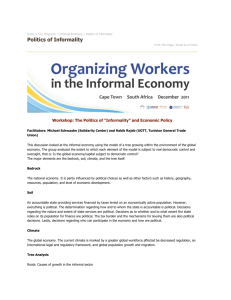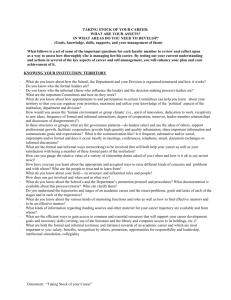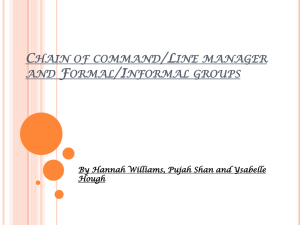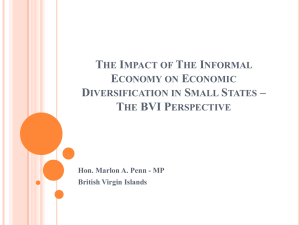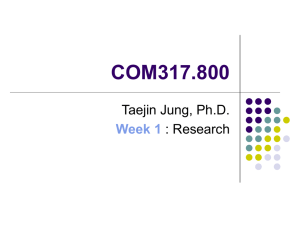DECENT WORK AGENDAIN THE INFORMAL ECONOMY
advertisement
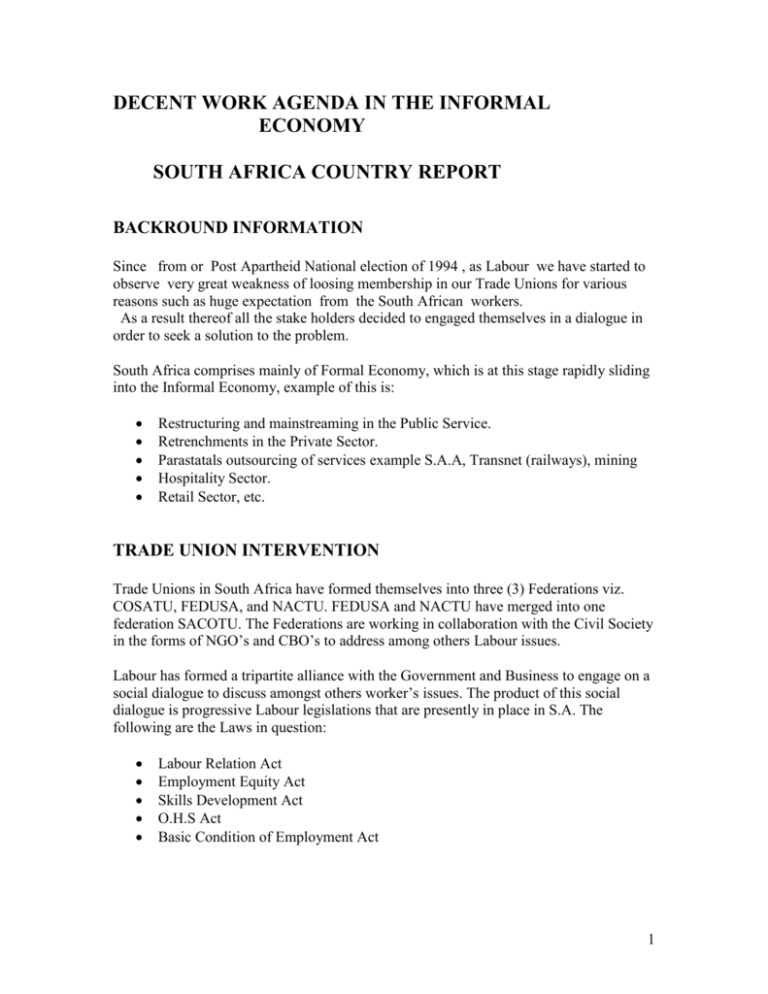
DECENT WORK AGENDA IN THE INFORMAL ECONOMY SOUTH AFRICA COUNTRY REPORT BACKROUND INFORMATION Since from or Post Apartheid National election of 1994 , as Labour we have started to observe very great weakness of loosing membership in our Trade Unions for various reasons such as huge expectation from the South African workers. As a result thereof all the stake holders decided to engaged themselves in a dialogue in order to seek a solution to the problem. South Africa comprises mainly of Formal Economy, which is at this stage rapidly sliding into the Informal Economy, example of this is: Restructuring and mainstreaming in the Public Service. Retrenchments in the Private Sector. Parastatals outsourcing of services example S.A.A, Transnet (railways), mining Hospitality Sector. Retail Sector, etc. TRADE UNION INTERVENTION Trade Unions in South Africa have formed themselves into three (3) Federations viz. COSATU, FEDUSA, and NACTU. FEDUSA and NACTU have merged into one federation SACOTU. The Federations are working in collaboration with the Civil Society in the forms of NGO’s and CBO’s to address among others Labour issues. Labour has formed a tripartite alliance with the Government and Business to engage on a social dialogue to discuss amongst others worker’s issues. The product of this social dialogue is progressive Labour legislations that are presently in place in S.A. The following are the Laws in question: Labour Relation Act Employment Equity Act Skills Development Act O.H.S Act Basic Condition of Employment Act 1 INFORMAL ECONOMY The unemployment rate in S.A presently is around 25%. Most of these unemployed people were once members of Trade Unions. This has led to the decline in Trade Union membership. Some of the unemployed would like to join the Informal Economy, but due to lack of sources are unable to join this sector. Majority of these individuals cannot access finances due to the fact that they do not have collaterals that are needed by the financial institutions. Trade Unions to advocate for the financial institutions to relax their lending conditions to accommodate this group. In the Informal Economy, workers are found in the following sectors: Domestic workers Agriculture/Farming Textile Street vendors Hawkers Majority of workers are organized in, Agriculture, Textile, and Domestic. The sectors that have not been organized are vendors and hawkers. These groups are affiliated to NGO’s that are part of the civil society. Trade Unions work in collaboration with the civil society in addressing issues of this sector. CHALLENGES FACING TRADE UNIONS IN THIS SECTOR Non compliance with Legislations by the employers. Employment of None Document Immigrants with a view to exploitation of workers Non cooperation of illegal Immigrants in working with the Trade Unions due to their insecurities. Lack of resources (capacity) Large numbers of SA workers who are not yet been organized as we speak are at 60 % Only 40 % that are organized as we speak. HIV & AIDS is a big threat. Out of 48 million population of our country, only about 18 million that are country employed as full time employees. The different number would be composed or shared between other component i.e. Youth, Senior Citizen or pensioners, and rest huge number would the UN employed. Harassment of the Informal Economy Workers by the Public Authorities. 2 Lack of access finances due to the fact that they do not have securities. Fear to join Trade Union by the Informal Economy Workers. Un safety working conditions. Lack of Capacity to Organized the un organized Informal Economy Workers. RECOMMENDATIONS Trade Unions to Organize and lobby for the rights of workers in the Informal economy. Develop strategies to address issues in the informal economy. Build capacity in the organizers and provide the Leadership Skill to our members to be able to sustain the organizing drive of the Informal Economy Workers. That ILO assists SACOTU to fulfill its mission and its Objectives. To provide training on capacity building leadership skill to our members to be able to organize more membership Informal Economy. Supplying with material documentation that are relevant to the subject and fund the said Project. Building Democratically Independent Representative Informal Economy Association. To provide supporting Material Documentation and Funds or assist to sustain the project. I thank you. PREPARED BY; IMATU, HOSPERSA AND HOTELICCA OBO NACTU AND SACOTU. 3

